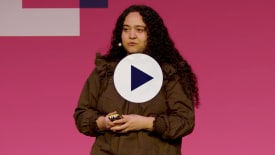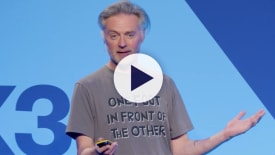
Latest videos
-

Latency, load, and leadership: Building a team nervous system
Discover how to build feedback systems that detect early stress signals, enabling healthier, more resilient, and productive teams.
-

Scaling LinkedIn’s search infrastructure: Key decisions and engineering challenges
Explore the key engineering decisions and challenges behind scaling LinkedIn’s search infrastructure to support billions of daily queries.
-

Compiler makeover: How technical debt created happier developers
Tired of endless patches and quick fixes to your developer tools? So were we. Learn how we at WSO2 turned our outdated Ballerina compiler into a driver of innovation, community growth, and happier developers.
-

Becoming AI engineers
Discover how to build reliable, high-impact AI features—tools, patterns, and team practices that make AI integration truly transformative
-

Effortless execution: Designing processes that don’t need babysitting
Discover five characteristics of team processes that can save your sanity, improve your relationships, and let your team take pride in being a well-oiled machine.
-

Monolith-ifying perfectly good microservices
Learn why consolidating microservices into a Rails monolith boosted performance, reduced complexity, and helped Intercom scale more efficiently
-

How to make the perfect decision
Master decision-making in software architecture with frameworks that drive alignment, reduce risk, and deliver meaningful, context-aware outcomes
Highlights from our conferences

Measure for Change
Picking metrics is one thing. But the harder decisions lie in what to do with them afterward.
View all videos from LeadDev London

Drive product gaps as an engineering leader
Discover practical strategies for engineering leaders to influence product development effectively, even in the absence of strong product management and a clear company vision.
view all videos from LeadDev NEW YORK

Growth in a downturn
In this talk, Smruti Patel asks, if hyper-growth is marked by spending more to make more, what does building for enduring growth look like?
view all videos from LeadDev berlin

Idea to Innovation
Join me as we embark on a journey to dissect the anatomy of innovation, uncover strategies to unlock the full potential of ideas, and transform them into impactful realities. Let’s build a strong culture of innovation, and make sure that it is not just a buzzword but a tangible outcome.
view all videos from staffplus london

Slack enterprise key management: Senior to staff lessons
Explore the key lessons and skills Audrei gained during their first Staff+ project, Slack Enterprise Key Management. This talk offers insights for anyone growing in their Staff+ career.
view all videos from staffplus NEW YORK
All videos
-
Running An Effective Mobile Engineering Team
Organisations often worry about their mobile teams. Sometimes they are a bit separate. There’s often this inexplicable hostility to mentions of “React Native”.
-
Navigating different communication styles as engineers
Have you ever been told you’re “too direct,” or feel like you don’t understand what others want? Or on the other side, do you think others are often too confrontational?
-
The Original Skunk Works
Long before Agile and Lean became buzzwords, a scrappy group of aerospace engineers at Lockheed’s Skunk Works were using similar practices to produce some of the most amazing aircraft ever built.
-
Failing smarter and learning faster in engineering
Software development has been evolving. When I started in the industry, working at companies like Microsoft, we would bet many person-years of development and many millions of dollars into the development of products that would sometimes be hits and sometimes be total duds
-
Documentation in Agile
We value “working software over comprehensive documentation”. That is, while there is value in documentation, we value working software more.
-
Building and Scaling a Distributed and Inclusive Team
The current status quo in running and scaling out teams is to have everyone work in the same office or in offices across different locations.
-
Starting, executing, and landing big rewrites
There’s nothing more frustrating than not being able to deliver new features because of unnecessarily complicated code.
-
How to automate a11y testing
Are you still testing accessibility by hand? Or worse, have a dedicated person doing so? Stop! Now!
-
How to mentor Junior Engineers
To get her foot in the door, she had to convince very smart people that she could write software because she can do ballet. It took a few tries.
-
Rethinking the Developer Career Path
Our current methods for measuring a developer’s career progression are broken. At best, we count the number of days someone’s been paid to write code and massage that into a title. As a result, there’s no consensus as to what a given title means, leading to frustration for everyone.
-
How tech hiring fails us all
From the outrageous to the sad, hiring experiences in tech can be really … bad! For the hiree and the hirer! From both sides of the table, Crystal has seen illegal and immoral behaviour — choices that damage companies as much as they damage individuals. Let’s do better. Please. We can improve this.
-
The Inclusive Leader: Tips for Developing Diverse Engineering Teams
Managing people is hard. Managing people who aren’t like you is harder. As we push to build more diverse teams, how do we ensure everyone can succeed equally?
-
Centralising the Right Things
uSwitch has a strong dev ops culture, we’ve learnt over time what should be handled by teams and what the organisation should provide.
-
What engineering leaders need to know about blockchain
If you’ve not been hiding under a rock, you must have heard about Blockchain. This session will throw some light on why it matters to businesses and techies, and how is it chaining the world one block at a time.
-
Lending privilege as engineering leaders
Diversity and inclusion have become hot topics in technology, but you may not know how you can make a difference. This talk will help you understand that, no matter your background, you have privilege and can lend it to marginalized groups in tech.
-
First steps for tech leads
You’ve been programming for a while now. You know your way around the code, and you’re becoming a go-to for technical advice. And it looks like someone else noticed, because you’re the technical lead on your next project.
-
Leading radical change as an engineering manager
February 2017 will mark a year since I started in a role aimed at radically changing how Indeed thinks about front-end engineering.
-
The building built on stilts
In the summer of 1978, structural engineer William LeMessurier got a phone call that terrified him. An undergraduate student claimed that LeMessurier’s acclaimed 59-story Citicorp Center in Manhattan, just completed the year prior, was dangerously unstable under certain wind conditions. The student was right, and it was almost hurricane season.
-
An introduction to polymer
As a Senior Principal Engineer for Comcast I’ve been doing web development for a long time, and over the course of my career I’ve spent a lot of time keeping up with the evolution of the web platform.
-
Work-life balance as an engineering leader
In this talk it is shown that some features of work addiction are similar to other addictions, and how workaholism relates to burnout, low job satisfaction, high levels of job strain and health complaints.
-
Engineering retrospectives – Look back, move forward
Retrospectives are one of the most powerful tools in a team lead’s toolkit.
-
An Swift introduction
Since its initial release in 2014 and subsequent open-sourcing in 2015 Swift has become one of the most popular programming languages in the world — used everywhere from mobile to Macs to microservices.
-
The challenges and rewards of distributed teams
Distributed teams offer many benefits for employers and employees alike. Having a distributed team can make recruiting and retention easier, and it can help you build a diverse team.
-
Creating observable microservices
Think of this talk as a Microservices 201. You know the basic of microservices and their pros and cons, but can you successfully maintain them in production?